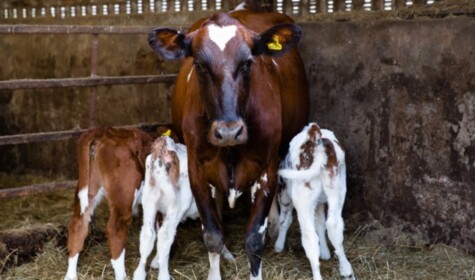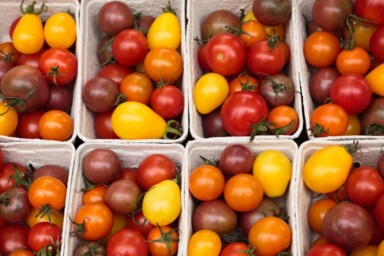What happens when you gather farmers, environmentalists, educators, public health specialists and food sovereignty advocates to explore the future of food in Wales? Alicia Miller, SFT’s Content Editor, reports back from the latest Wales Real Food and Farming Conference to reveal some of the conversations that took place, from the shake-up of Wales’ farm payment schemes to innovating around school meals and investing in civil resilience.
This was the fifth year of the Wales Real Food and Farming Conference – an independent event that brings together farmers, growers and others from the world of food, health and social and environmental justice. As a grassroots, volunteer-run event, the Conference delivered another lively opportunity for debate and thought on what is needed to create a sustainable food and farming system for the Welsh nation.
The WRFFC, which originally took its lead from the Oxford Real Food and Farming Conference, set-up shop this year at Coleg Cambria Llysfasi, near Ruthin in north-east Wales. Llysfasi is one of Wales’ leading centres of land-based education; set in gorgeous countryside, it was a lovely place to host the Conference and a fitting reminder of the landscape that we rely upon to feed us. The catering was provided by Iâl, a restaurant in Wrexham that specialises in locally sourced food, all of which was delicious – no mean feat amongst people who care about food from the ground up.
The Conference opened with guest speaker Sarah Dickins. Dickins is a former BBC presenter and award-winning organic beef producer who is now working on the Wales Net Zero 2035 initiative. Chatty and engaging, she reminded everyone in the room of the pertinence of climate change and the dangers of our current food system, commenting that, “We’re seeing the impact of climate change daily, along with extreme storms, floods, droughts and wildfires. Our seasons have changed. We can all see that…And that’s happening all around the world.” And continuing, she notes that the food system “is based on exploiting nature for short-term monetary gain”, before commenting about the elephant in the room – the cessation of Glastir Organic at the end of this year – which led her to comment that “strangely, there’s no funding for organic farming…”.
It is hard not to foreground the opening discussion on the second day of the Conference, Defining Sustainability under the Sustainable Farming Scheme. SFT Executive Director, Adele Jones, chaired the panel with speakers Steven Jacob at Organic Farmers and Growers and the Welsh Organic Forum, Holly Tomlinson at the Landworkers’ Alliance and Andrew Tuddenham at the Soil Association. Jones outlined the context of the session: the strong feelings of many Welsh farmers, who are deeply “underwhelmed” by the future farming schemes and the nature of support that will be available and how this may impact incomes.
The murky end of Glastir has left many, especially organic farmers in Wales, up in arms, but despite a strong coalition of defenders – the Welsh Organic Forum, the Soil Association, Organic Farmers and Growers (OF&G) among others – all Glastir programmes will cease at the end of this year. After the success of the Agriculture Bill this past August, a milestone for Wales, it’s deeply disturbing to find that the Welsh Assembly would so readily dismiss organic practice. Tuddenham was most disparaging, commenting in the session that the Welsh Government “has cast aside the very set of farmers who have been delivering and leading on nature-friendly and low-carbon practices…so it looks almost catastrophic on that front”.
Similarly, Holly Tomlinson responded to the question, “How are you feeling about the scheme?” with a terse, “Not very good”, pointing out the new Habitat Wales scheme didn’t really do much for horticulture and that the question of how Wales might feed itself sustainably, was rather side-lined. Steven Jacob argued that one of the fundamental systemic issues faced in relation to climate change is the short-termism of the parliamentary schedule – it is not positioned to address the enormity of what we are facing in terms of climate change and the nature emergency.
Untangling a way forward for Welsh Government policy in relation to the Sustainable Farming Scheme is not going to be easy; Welsh Government have declared a funding shortfall and, sadly, it does indeed look as if there will be much less support for all farmers in Wales under the Habitat Wales scheme. Furthermore, payment decisions for the Sustainable Farming Scheme are so far undetermined until 2027 – if Welsh Government go ahead with a proposed gap in funding between 2025 and 2027, it may be devastating, hitting organic dairy farmers particularly hard.
Since the Conference, the Welsh Organic Forum deputy chair, Steven Jacobs, has said that Farming Minister, Lesley Griffiths, acknowledges the plight of organic farmers across Wales and has found some additional funding, but the details of what and how much won’t be available until 2024 – a long wait for farmers whose future hangs in the balance.
Despite the gloom and doom of the Sustainable Farming Scheme session, there is much that is exciting going on in Wales. A number of projects are developing that are seeking to improve school meals – focused around the local, sustainable produce of small-scale growers. The session on School Meals: Action for Future Generations discussed the difficulties and challenges of realising this, with some potentially remarkable results. One of the key challenges has been the cost of local organic veg and the need to pay growers appropriately; it has required some strong thinking outside of the box. In negotiating price, one idea is to develop a fund to support sustainable locally produced food, explicitly directed into public procurement for schools in Wales. Castell-Howell, a Welsh food supplier, has stepped in to work with a range of small-scale producers to explore how they might collaborate. What has long felt to be impossible – local sustainable food fed to children in local schools, may not be out of reach anymore.
In a similar vein, Progressive Pathways for County Farms also focuses on the expansion of sustainable horticulture in Wales and this, again, encompasses two current projects to integrate edible horticulture on the estates of county farms in Carmarthenshire and Powys. Both are engaged with the potential of these farms to feed the public plate – bringing vegetable production in alongside the traditional beef and sheep. There are great opportunities opening up to mixed farming through the County Farms and great potential along with it, to create more diversified businesses that feed a broader local public.
This year’s Conference ended with Tim Lang, ever lively and engaging as he lays out the work ahead for the future food systems of the world and how we create them anew, making a strong argument for investing in civil resilience. “We’ve got to connect resilience to sustainability to security…to social cohesion,” he comments. Avidly aware of the task ahead, he wants a food system that is moving from a ‘just in time’ model to one that is ‘just in case’. His warnings should not be dismissed, and his answers point a way forward to a resurgence of localism and ‘bio-regionalism’ which will work from the inside out towards a just and fair food system for Britain.







